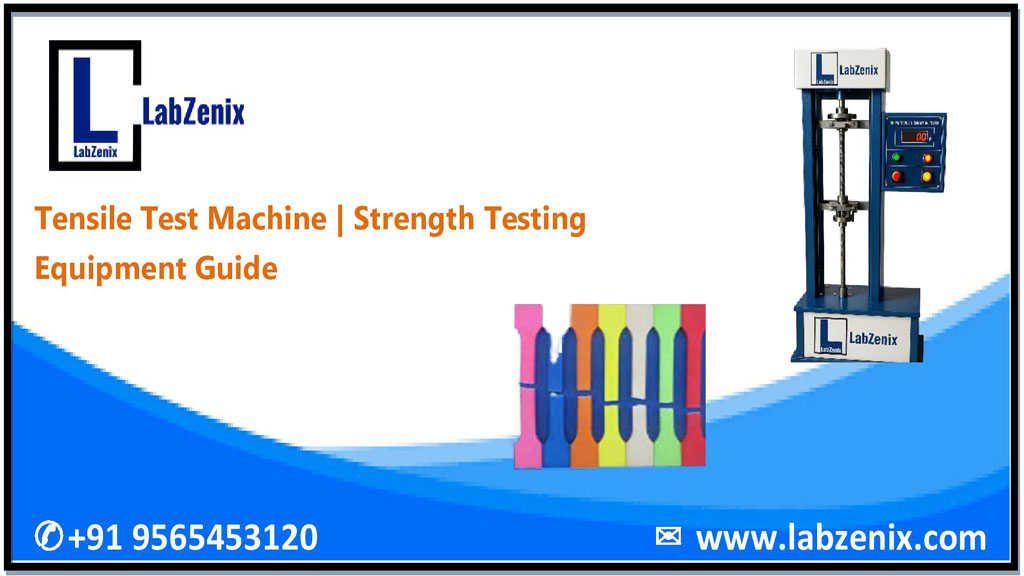Tensile Test Machine | Strength Testing Equipment Guide
Tensile Test Machine | Strength Testing Equipment Guide – LabZenix
Explore the Tensile Test Machine | Strength Testing Equipment Guide by LabZenix—your trusted partner for accurate, durable, and efficient testing tools.
Description
Tensile Test Machine | Strength Testing Equipment Guide
In the world of material testing and quality control, precision is everything. Whether it’s plastic, rubber, metal, textile, or any other industrial material, evaluating its mechanical strength is vital for manufacturers. One of the most trusted and widely used tools in this process is the Tensile Test Machine. Also referred to as a universal strength tester, this equipment provides key insights into how materials will behave under tension, making it a core component in any strength testing equipment guide.
What is a Tensile Test Machine?
A Tensile Test Machine is a mechanical testing device that determines how a material reacts when stretched or pulled. It applies a controlled tensile force to the specimen until it fails, breaks, or deforms. The data obtained from this test reveals important mechanical properties such as tensile strength, elongation, yield point, and modulus of elasticity.
This makes the Tensile Test Machine a critical tool in research and development, production quality control, and material certification across various industries. LabZenix offers state-of-the-art tensile testing systems that deliver accuracy, consistency, and reliability with every test.
Why Strength Testing is Essential in Manufacturing
The goal of every manufacturer is to produce reliable and durable products. To achieve this, understanding the strength and flexibility of materials before putting them into use is mandatory. The Tensile Test Machine | Strength Testing Equipment Guide is essential for product safety, regulatory compliance, and customer satisfaction.
Different materials have different strength thresholds. For example:
A plastic bottle must not crack under pressure.
A metal bolt must not stretch beyond a safe limit.
A fabric used in airbags must resist tearing during inflation.
By using strength testing equipment like a tensile tester, manufacturers can fine-tune their materials for optimal performance under expected stress conditions.
How a Tensile Test Machine Works
The basic working principle of a Tensile Test Machine involves clamping the specimen between two grips. One grip remains stationary while the other moves to apply tension. The machine records data in real-time, plotting a stress-strain curve that visually represents the material’s behavior.
Key components of a tensile tester include:
Load Cell: Measures the force applied.
Crosshead: Moves to create tension.
Grips/Fixtures: Hold the specimen in place.
Controller & Software: Process and display the results.
LabZenix tensile machines are designed with modern digital interfaces, ensuring high-resolution data acquisition and easy-to-use controls.
Types of Tensile Testing
As highlighted in the Tensile Test Machine | Strength Testing Equipment Guide, there are different types of tensile testing based on the material and test purpose:
1. Uniaxial Tensile Test
The most common form, applying tension in a single direction until failure.
2. Cyclic Tensile Test
Involves repeated loading and unloading to test fatigue and durability.
3. Creep Test
Applies constant load over a long period to test deformation over time.
4. Tensile Shear Test
Evaluates bonding strength between materials or layers.
Each test requires accurate control and precision, which LabZenix tensile testing machines deliver effortlessly.
Applications of Tensile Testing Machines
Tensile testers are used in a wide range of industries, including:
Automotive – testing seat belts, metal parts, plastic trims.
Packaging – ensuring strength of plastic films, bottle caps.
Construction – evaluating concrete reinforcements, steel rods.
Textiles – checking yarn, thread, and fabric strength.
Medical – testing tubing, surgical gloves, and adhesives.
Aerospace – validating composite materials and metal fasteners.
Thanks to their versatility, tensile test machines from LabZenix are suited for both lab environments and industrial production units.
Choosing the Right Tensile Test Machine
When selecting a Tensile Test Machine, there are a few important considerations:
Load Capacity: Measured in kN or pounds. Choose based on the strength of the materials tested.
Testing Speed: Faster testing improves throughput in production setups.
Grips and Fixtures: Different samples require different holding mechanisms.
Software Features: Advanced software allows custom test profiles and report generation.
Compliance Standards: Machines must support ISO, ASTM, and other relevant standards.
LabZenix provides fully customizable machines to match the exact needs of different industries, all built with compliance and future-proofing in mind.
FAQs – Tensile Test Machine | Strength Testing Equipment Guide
Q1. What materials can be tested using a tensile test machine?
A: Tensile test machines can be used to test a wide range of materials including metals, plastics, rubber, textiles, paper, wires, and composites. LabZenix tensile machines come with interchangeable grips and fixtures for various sample types.
Q2. What does a stress-strain curve tell us?
A: A stress-strain curve provides crucial data on how a material behaves under stress. It shows the relationship between the force applied and the elongation of the material, helping identify properties like yield strength, ultimate tensile strength, and elasticity.
Q3. Is calibration required for tensile test machines?
A: Yes, regular calibration is essential for accuracy and compliance with testing standards. LabZenix offers calibration services and user-friendly interfaces that allow in-house verification and adjustment.
Q4. How often should strength testing be done in a manufacturing process?
A: The frequency depends on the industry and quality protocols. In high-precision industries like aerospace or medical, daily or batch-wise testing is common. In general manufacturing, periodic sampling may suffice.
Q5. Can a tensile testing machine be used for compression tests?
A: Some universal models can perform both tensile and compression tests by changing the fixtures and software settings. LabZenix provides multi-purpose machines that support multiple testing modes.
Q6. What is the difference between a manual and an automated tensile testing machine?
A: Manual machines are cost-effective and suitable for low-volume testing. Automated machines offer higher accuracy, consistency, and data recording features, ideal for industrial or high-volume lab environments.
Q7. Does LabZenix provide training for tensile testing machines?
A: Absolutely. LabZenix offers full installation, calibration, and training support, ensuring your team is fully equipped to operate the machine and analyze test results efficiently.
Contact – LabZenix

